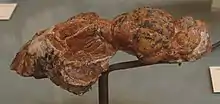Quercygale
Quercygale is an extinct genus of Miacidae, primitive carnivores that lived during the Eocene.[2] The genus contains four species: Q. angustidens, Q. hastingsae, Q. helvetica, and Q. smithi.[1] Phylogenetic analysis of the basicranial morphology of miacid carnivoramorphans suggests Quercygale is the most advanced miacid and sister to crown group Carnivora, predating the split between Feliformia and Caniformia.,[3][4] although another recent study places them as a stem group within Feliformia.[5]
| Quercygale[1] Temporal range: Middle to Late Eocene | |
|---|---|
 | |
| skull of species Quercygale angustidens | |
| Scientific classification | |
| Kingdom: | Animalia |
| Phylum: | Chordata |
| Class: | Mammalia |
| Family: | †Miacidae |
| Genus: | †Quercygale Kretzoi, 1945 |
| Type species | |
| Quercygale angustidens | |
| Species | |
| |
Taxonomy
| Species | Authority | Type locality | Status |
|---|---|---|---|
| Q. angustidens | Filhol, 1872[6] | Quercy Phosphorites (France) | Described as Viverra angustidens, later as Humbertia angustidens De Beaumont 1965;[7] assigned to Quercygale by Wesley-Hunt & Flynn (2005)[3] |
| Q. hastingsae | Davies, 1884[8] | Headon Bedes (England) | Described as Viverra hastingsae; assigned to Quercygale by Wesley-Hunt & Flynn (2005)[3] |
| Q. helvetica | Rütimeyer, 1862[9] | ? (Switzerland) | |
| Q. smithi | Sole et al., 2014[4] | Mutigny and Mancy (France) |
Sources
- "Quercygale". www.paleodb.org. Retrieved 11 March 2017.
- McKenna, M. C.; Bell, S. K. (1997). Classification of Mammals: Above the Species Level. Columbia University Press. p. 631. ISBN 978-0-231-11013-6.
- Wesley-Hunt, G.D.; Werdelin, L. (2005). "Basicranial morphology and phylogenetic position of the upper Eocene carnivoramorphan Quercygale". Acta Palaeontologica Polonica. 50 (4): 837–846.
- Solé, Floréal (2014-09-01). "New carnivoraforms from the early Eocene of Europe and their bearing on the evolution of the Carnivoraformes". Palaeontology. 57 (5): 963–978. doi:10.1111/pala.12097. ISSN 1475-4983.
- Tomiya, Susumu; Tseng, Zhijie Jack (2016). "Whence the beardogs? Reappraisal of the Middle to Late Eocene 'Miacis' from Texas, USA, and the origin of Amphicyonidae (Mammalia, Carnivora)". Royal Society Open Science. 3 (10): 160518. Bibcode:2016RSOS....360518T. doi:10.1098/rsos.160518. ISSN 2054-5703. PMC 5098994. PMID 27853569.
- Filhol, H (1872). "Recherches sur les mammifères fossiles des dépots de phosphate de chaux dans les départements du Lot, du Tarn et de Tarn−et− Garonne". Annales des Sciences Géologiques. 3: 1–31.
- Beaumont, G. de 1965. Les Viverravinae (Carnivora, Miacidae) de l’Eocène de la Suisse. Bulletin de la Société Vaudoise des Sciences Naturelles 69: 133–146.
- Davies, W (1884). "Notes on some new carnivores from the British Eocene formations" (PDF). Geological Magazine NS, Decade III. 1 (10): 433–438. Bibcode:1884GeoM....1..433D. doi:10.1017/s0016756800185802.
- Rütimeyer, L (1862). "Eocäne Säugethiere aus dem Gebiete der Schweitzerischen Jura". Denkschrifte der Schweitzerische Gesellschaft für Naturwissenschafte. 19: 1–98.
This article is issued from Wikipedia. The text is licensed under Creative Commons - Attribution - Sharealike. Additional terms may apply for the media files.